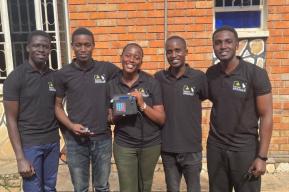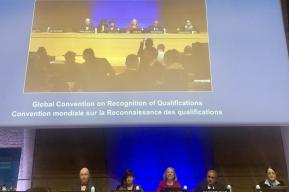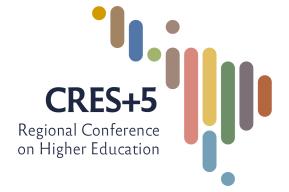News
Call for transformation runs through UNESCO World Higher Education Conference
Gathering 2,000 participants from 139 countries, the Third World Higher Education Conference (WHEC20222) kicked off a movement to create more open, inclusive, equitable and collaborative higher learning systems geared to the complexity and challenges of our times.
At the closing of the Conference, held from 18 to 20 May in Barcelona, Spain UNESCO Assistant Director-General for Education Stefania Giannini introduced a roadmap entitled “Beyond Limits: New Ways to Reinvent Higher Education” that outlines key principles and transitions to reorient higher education in the decade ahead.
“Our starting point is that higher education is an integral part of the right to education and a public good”, she said. “Transformation takes a shift in mindsets to privilege cooperation over competition; diversity over uniformity, flexible pathways over traditionally structured ones; openness over more elitist viewpoints.”
The document is guided by two-time frames: the 2030 Agenda for Sustainable Development and the 2050 horizon line of the Futures of Education initiative.
It sets forth key principles to guide this transformation encompassing inclusion and diversity; the protection of academic freedom; integrity and ethics and a commitment to sustainability and social responsibility.
It outlines transitions to favour more transdisciplinary, flexible and lifelong approaches to learning and knowledge that respond to society’s needs, and to put technology at the service of effective, learning and research.
“Educating citizens to address and navigate complexity is one of the main missions of universities today,” said Ms Giannini. “This calls for connecting the sciences and the humanities, for promoting open science and integrating different knowledge systems.”
An online consultation on the document will be organized over the next months, with its outcome informing the SDG4 global roadmap to be adopted in November by the High-Level Steering Committee.
Transforming higher education for global sustainability
During the conference, the Expert Group on Universities and the 2030 Agenda initiated by UNESCO and the University of Bergen, launched its report, "Knowledge-driven actions: Transforming higher education for global sustainability". Its three core themes - to go beyond disciplinary boundaries; to promote a truly global knowledge-base for the SDGs; and to expand partnerships with civil society - ran through the Conference.
UNESCO’s Futures of Education initiative stressed the role of universities in forging a new social contract for education and advancing sustainability. In her message, the International Commission’s Chair, President Sahle-Work Zewde of Ethiopia, stated the “need for a new culture of collaboration and cooperation within and between institutions (….) to create and realize solutions together.” Commission member Professor António Nóvoa gave a passionate address, warning against the dangers of commodification and standardization. “One of the most damaging trends of recent decades is the idea that there is a single university model induced by uniform rankings that all should seek to emulate. Universities need to develop their own projects based on their histories, roots and missions. Global standardization does not serve the internationalization of cooperation and opportunities for the mobility of all students and teachers and the purpose of a multicentered world.”
With student mobility forecast to double in the decade, the Conference urged countries to ratify the Global Convention on the Recognition of Qualifications concerning Higher Education, during a special session gathering the 14 countries that had already ratified it. Sweden became the 15th country to follow suit on the last day of the Conference, a step further towards the 20 required for the Convention to enter into force. In a moving testimony, Aisha Khurram, a student from Afghanistan who fled her country last year to Germany, called upon “all Member States to think of refugees as people with potential, capacities, hopes and aspirations, and to facilitate their access to higher education by ratifying the Global Convention to help them thrive, not just survive.”
In her keynote address to the Conference, Professor Sylvia Schmelkes from Mexico stressed the urgency of transformation to address climate change and inequalities. “Change always generates resistance, but barriers to strengthening the potential impact of higher education in society at large must be brought down, and structural and cultural transformations have to be put in place…. As a higher education academic and a former University leader myself, I find this to be an ethical imperative for all higher education institutions.”
The Conference engaged ministers, academics, researchers, students, teachers, entrepreneurs, civil society and the private sector in more than 120 roundtables and side events; 86 HED talks and 5 youth-led activities. Segments of the gathering can be viewed online in English, French and Spanish.
- More on the Third World Higher Education Conference
- More on UNESCO’s work in higher education
- Higher education: How do we unleash the talent of the next generation?






